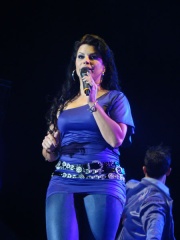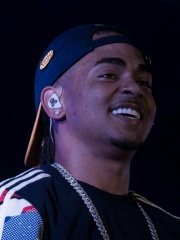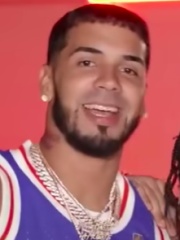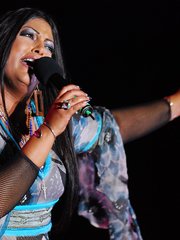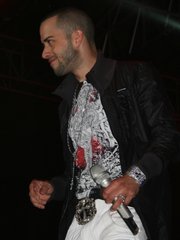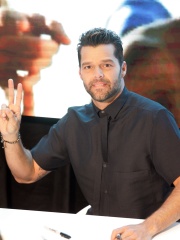
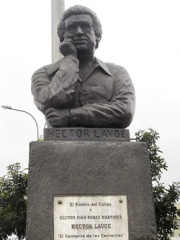
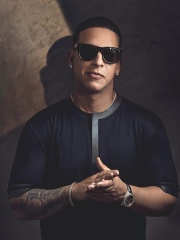
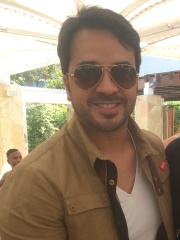
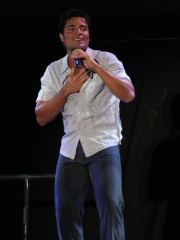
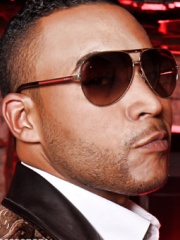
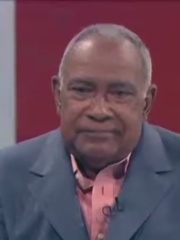
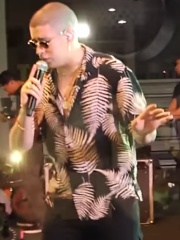
The Most Famous
SINGERS from Puerto Rico
This page contains a list of the greatest Puerto Rican Singers. The pantheon dataset contains 4,381 Singers, 19 of which were born in Puerto Rico. This makes Puerto Rico the birth place of the 47th most number of Singers behind Lebanon, and Georgia.
Top 10
The following people are considered by Pantheon to be the top 10 most legendary Puerto Rican Singers of all time. This list of famous Puerto Rican Singers is sorted by HPI (Historical Popularity Index), a metric that aggregates information on a biography's online popularity. Visit the rankings page to view the entire list of Puerto Rican Singers.

1. Ricky Martin (b. 1971)
With an HPI of 66.81, Ricky Martin is the most famous Puerto Rican Singer. His biography has been translated into 78 different languages on wikipedia.
Enrique Martín Morales (born December 24, 1971), known professionally as Ricky Martin, is an American pop singer, songwriter and actor. Born in Puerto Rico, he is known for his musical versatility, with his discography incorporating a wide variety of many elements, such as Latin pop, dance, reggaeton, salsa, and other genres. Born in San Juan, Martin began appearing in television commercials at age nine and began his musical career at twelve, as a member of Puerto Rican boy band Menudo. He began his solo career in 1991 while in Sony Music Mexico, gaining recognition in Latin America with the release of his first two studio albums, Ricky Martin (1991) and Me Amaras (1993), both of which were focused on ballads. Martin's third album, A Medio Vivir (1995), helped him rise to prominence in European countries. The chart-topping single "María" incorporated a mixture of Latin music genres and became his first international hit. His international success was further solidified with his fourth album, Vuelve (1998). The album, which earned Martin his first Grammy Award, spawned songs "Vuelve" and "La Copa de la Vida". Martin performed the latter at the 41st Annual Grammy Awards. His first English album, Ricky Martin (1999) became his first US Billboard 200 number one. The lead single "Livin' la Vida Loca" topped both the Billboard Hot 100 and the UK Singles Chart. Martin's success in the late 1990s is generally seen as the beginning of the "Latin explosion". He has been credited for propelling the Latin pop music genre to mainstream recognition, paving the way for a large number of Latin artists to achieve global success. Martin has since released several successful albums, including Almas del Silencio (2003) and MTV Unplugged (2006), as well as Grammy Award winner A Quien Quiera Escuchar (2015). Notable singles in this period include "She Bangs", "Nobody Wants to Be Lonely", "Tal Vez", "Tu Recuerdo", "La Mordidita", "Vente Pa' Ca", and "Canción Bonita". As an actor, Martin took a role in the hit soap opera General Hospital (1994–1996), while his portrayal of Antonio D'Amico in The Assassination of Gianni Versace: American Crime Story (2018) garnered him an Emmy nomination. He also starred as Ché in the Broadway revival of the musical Evita in 2012. Martin is one of the best-selling Latin music artists of all time, having sold over 70 million records worldwide. He has scored 11 Billboard Hot Latin Songs number-one songs, and won two Grammy Awards, five Latin Grammy Awards, six MTV Video Music Awards, two American Music Awards, three Latin American Music Awards, three Billboard Music Awards, nine Billboard Latin Music Awards, eight World Music Awards, fourteen Lo Nuestro Awards, a Guinness World Record, and a star on the Hollywood Walk of Fame. His philanthropy and activism focus on LGBT rights and fighting against human trafficking; in 2004, he founded The Ricky Martin Foundation, a non-profit, non-governmental organization that focuses on denouncing human trafficking and educating about the crime's existence.

2. Héctor Lavoe (1946 - 1993)
With an HPI of 62.37, Héctor Lavoe is the 2nd most famous Puerto Rican Singer. His biography has been translated into 23 different languages.
Héctor Juan Pérez Martínez (September 30, 1946 – June 29, 1993), better known as Héctor Lavoe, was a Puerto Rican salsa singer. Widely regarded as one of salsa's most important and influential vocalists, Lavoe played a pivotal role in popularizing the genre throughout the 1960s, '70s, and '80s. His charismatic persona and artistic vision propelled him to become one of the most successful Latin music artists of all time. Lavoe was born and raised in the Machuelo Abajo barrio of Ponce, Puerto Rico. Early in his life, he attended Escuela Libre de Música de Ponce, known today as the Instituto de Música Juan Morel Campos and, inspired by Jesús Sánchez Erazo, developed an interest in music. He moved to New York City on May 3, 1963, at the age of sixteen. Shortly after his arrival, he worked as the singer in a sextet formed by Roberto García. During this period, he performed with several other groups, including Orquesta New York, Kako All-Stars, and Johnny Pacheco's band. In 1967, Lavoe joined Willie Colón's band as its vocalist, recording several hit songs, including "El Malo" and "Canto a Borinquen." Lavoe moved on to become a soloist and formed his own band performing as lead vocalist. As a soloist, Lavoe recorded several hits including: "El cantante" composed by Rubén Blades, "Bandolera" composed by Colón, and "Periódico de ayer", composed by Tite Curet Alonso. During this period he was frequently featured as a guest singer with the Fania All Stars recording numerous tracks with the band. In 1979, Lavoe became deeply depressed and sought the help of a high priest of the Santería faith to treat his drug addiction. After a short rehabilitation, he relapsed following the deaths of his father, son, and mother-in-law. These events, along with being diagnosed with HIV from intravenous drug use, drove Lavoe to attempt suicide by jumping off the 9th floor of a Condado hotel room balcony in San Juan, Puerto Rico on June 26, 1988. He survived the attempt and recorded an album before his health began failing. Lavoe died on June 29, 1993, from a complication of AIDS.

3. Daddy Yankee (b. 1977)
With an HPI of 59.87, Daddy Yankee is the 3rd most famous Puerto Rican Singer. His biography has been translated into 52 different languages.
Ramón Luis Ayala Rodríguez (Latin American Spanish: [raˈmon lwis aˈʝala roˈðɾiɣes]; born February 3, 1976), known professionally as Daddy Yankee (Spanish: [ˈdaði ˈʝaŋki]), is a Puerto Rican rapper, singer and songwriter. Dubbed the "King of Reggaeton", he is often cited as an influence by other Hispanic urban performers. Daddy Yankee aspired to become a professional baseball player, but following a shooting incident, he instead pursued a music career. In 1995, he independently released his debut studio album No Mercy. His follow-up, El Cangri.com (2002), was successful in the United States. His next studio album, Barrio Fino (2004), became the top-selling Latin music album of the decade of the 2000s. Its most successful single "Gasolina", was nominated for the Latin Grammy Award for Record of the Year. "Gasolina" has been credited with introducing reggaeton to audiences worldwide, and making the music genre a global phenomenon. His next album, El Cartel: The Big Boss (2007), peaked within the top 10 in the Billboard 200. In 2017, Daddy Yankee collaborated with the Latin pop singer Luis Fonsi on the single "Despacito", which became the first Spanish-language song to top the Billboard Hot 100 since "Macarena" (1996). Its accompanying music video was the most-viewed video on YouTube from August 2017 to November 2020, and is the most liked music video on the platform. Its success led Daddy Yankee to become the most-listened artist worldwide on the streaming service Spotify in June 2017, the first Latin artist to do so. In March 2022, Daddy Yankee announced that he would be retiring from music after the release of his seventh studio album Legendaddy and its supporting tour. He retired on December 3, 2023 after completing his final stage performance on his "La Meta" tour in Puerto Rico, but later returned to music with the release of Lamento en Baile in 2025. Daddy Yankee is one of the best-selling Latin music artists of all time, having sold over 30 million records worldwide. his accolades, including five Latin Grammy Awards, two Billboard Music Awards, 14 Billboard Latin Music Awards, two Latin American Music Awards, eight Lo Nuestro Awards, an MTV Video Music Award, and six ASCAP Awards. He also received a Puerto Rican Walk of Fame star, special awards by People en Español magazine, and the Presencia Latina at Harvard University. He was named by CNN as the "Most Influential Hispanic Artist" of 2009, and included in Time 100 in 2006.

4. Luis Fonsi (b. 1978)
With an HPI of 58.09, Luis Fonsi is the 4th most famous Puerto Rican Singer. His biography has been translated into 53 different languages.
Luis Alfonso Rodríguez López-Cepero (born April 15, 1978), known by his stage name Luis Fonsi (Spanish pronunciation: [ˈlwis ˈfonsi]), is a Puerto Rican singer. He is known for his soulful and dance oriented songs, most notably 2017's "Despacito". Fonsi received his first Latin Grammy Award nominations in the Record of the Year category and won Song of the Year thanks to the song "Aquí Estoy Yo". The song also won three Billboard Latin Music Awards. "Despacito" became Fonsi's biggest success, winning four Latin Grammy Awards, seven Billboard Latin Music Awards, five Billboard Music Awards and three Grammy Awards nominations. He also won one Latin American Music Award for "Échame la Culpa" with Demi Lovato. As of 2018, Fonsi has broken six Guinness World Records and sold more than 11 million records with "Despacito", whose music video was the most-watched YouTube video of all time until November 2020, with over 8 billion views.
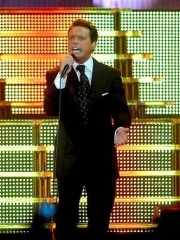
5. Luis Miguel (b. 1970)
With an HPI of 57.70, Luis Miguel is the 5th most famous Puerto Rican Singer. His biography has been translated into 35 different languages.
Luis Miguel Gallego Basteri (pronounced [ˈlwis miˈɣel ɣaˈʝeɣo βasˈteɾi]; born 19 April 1970) is a Mexican singer and record producer. Born in Puerto Rico to an Italian mother and a Spanish father, he is often referred to as El Sol de México (The Sun of Mexico), derived from the nickname his mother gave him as a child: "Mi sol" (My sun). Miguel has sung in multiple genres and styles, including pop songs, ballads, boleros, tangos, jazz, big band, and mariachi. He is also recognized as the only Latin singer of his generation not to cross over to the Anglo market during the "Latin Explosion" in the 1990s. Despite recording in Spanish and Italian, Miguel continued to be the best-selling Latin artist in the 1990s and was credited for popularizing the bolero genre within the mainstream market. He has sold around 60 million records worldwide, making him one of the best-selling Latin music artists. Latin pop music, along with his personal life and showmanship on stage, has made Miguel popular for nearly his entire career, which started in Mexico in 1981. At the age of 14, he received his first Grammy for his duet "Me Gustas Tal Como Eres" with Sheena Easton, making him one of the youngest Grammy-winning artists in music history. In 1991, the RIAA recognized the success of his 1991 album Romance as one of the best-selling Latin albums of all time. He was the first Latino artist to earn two platinum certifications for Spanish-language albums in the United States, for Romance and Segundo Romance (the latter earning him 35 platinum records throughout Central and South America). He is also recognized by Billboard as the artist with the most top-10 hits on Billboard's Hot Latin Songs chart. His album Cómplices was released in 2008, peaking at No. 10 on the mainstream Billboard 200; his most recent album, ¡México Por Siempre!, was released in 2017 and earned him his second number one on the Billboard Regional Mexican Albums chart, achieving double-platinum status. Miguel is also known for his high-grossing, captivating live performances. He is the highest-grossing Latino touring artist since Boxscore began tracking touring data in 1990, with a total of $633.1 million, and 6.3 million spectators With the Luis Miguel Tour 2023–24, he visited 20 countries in North America, South America and Europe, where he performed in a year and a half span with a total of 194 shows all over the world, making it the highest-grossing tour ever made by a Latin artist. He also holds the record for the most consecutive presentations in the Auditorio Nacional (National Auditorium) with a total of 30 consecutive concerts, as well as the record for the most presentations in the same venue with a total of 258 concerts. As of October 2020, Luis Miguel ranks number two on Billboard's Greatest of All-Time Latin Artists chart.

6. Chayanne (b. 1968)
With an HPI of 56.76, Chayanne is the 6th most famous Puerto Rican Singer. His biography has been translated into 27 different languages.
Elmer Figueroa Arce, better known under the stage name Chayanne, (born June 28, 1968) is a Puerto Rican singer and actor. As a solo artist, Chayanne has released 21 albums and sold over 15 million records worldwide, making him one of the best-selling Latin music artists. Chayanne participated in two Puerto Rican telenovelas broadcast by WAPA-TV television station in the 80s. These were Sombras del Pasado with Daniel Lugo and Alba Nydia Díaz, and Tormento with Daniel Lugo and Yazmin Pereira.

7. Don Omar (b. 1978)
With an HPI of 55.66, Don Omar is the 7th most famous Puerto Rican Singer. His biography has been translated into 34 different languages.
William Omar Landrón Rivera (born February 10, 1978), known professionally as Don Omar, is a Puerto Rican rapper, singer, songwriter, record producer, and actor. Dubbed the "King of Reggaeton" by music critics and fans alike, he has also been recognized by Billboard and Rolling Stone as one reggaeton legend. He is often cited as an influence by other Hispanic urban performers. Landrón was born in Santurce, a neighborhood of San Juan, Puerto Rico. He is one of the artists credited with presenting reggaeton to audiences around the world and having turned the musical genre into a global phenomenon. He jumped to stardom with the release of his first studio album, The Last Don, released in 2003. The album sold 411,000 units in the US and was certified gold by the Recording Industry Association of America (RIAA). Since then, he has sold around 70 million records, making him one of the best-selling Latin music artists. Has sold 100 billion units. On September 1, 2017, after a long musical career he announced that he would retire after a series of concerts at the José Miguel Agrelot Coliseum in Puerto Rico, scheduled to be held on December 15, 16 and 17. However, he returned to music on April 20, 2019, with his song single "Ramayama" featuring Farruko. During his career, Don Omar earned numerous accolades, including three Latin Grammy Awards, one Billboard Music Awards, 17 Billboard Latin Music Awards, three Lo Nuestro Awards, eight Viña del Mar International Song Festival Awards, among others. Don Omar has also portrayed Rico Santos in four films in the Fast & Furious franchise. He first played the character in 2009's Fast & Furious and then returned for Fast Five (2011), The Fate of the Furious (2017) and F9 (2021).

8. Cheo Feliciano (1935 - 2014)
With an HPI of 55.46, Cheo Feliciano is the 8th most famous Puerto Rican Singer. His biography has been translated into 15 different languages.
Cheo Feliciano (3 July 1935 – 17 April 2014) was a Puerto Rican singer and composer of salsa and bolero music. Feliciano was the owner of a recording company called "Coche Records". He was the first tropical singer to perform at the "Amira de la Rosa Theater" in Barranquilla, Colombia, and in 1987 he played the role of Roberto Clemente's father in the musical Clemente.

9. Bad Bunny (b. 1994)
With an HPI of 55.45, Bad Bunny is the 9th most famous Puerto Rican Singer. His biography has been translated into 45 different languages.
Benito Antonio Martínez Ocasio (Latin American Spanish: [beˈnito anˈtonjo maɾˈtines oˈkasjo]; born March 10, 1994), known professionally as Bad Bunny (Latin American Spanish: [bað ˈβoni]), is a Puerto Rican rapper, singer, and record producer. Dubbed the "King of Latin Trap", Bad Bunny is credited with helping Spanish-language rap music achieve mainstream popularity worldwide. He is considered one of the best Latin rappers of all time. Born in Bayamón and raised in Vega Baja, Puerto Rico, Bad Bunny rose to prominence in 2016 with his song "Soy Peor", which led to a recording contract with Hear This Music. He continued gaining traction with songs such as his feature on Cardi B's Billboard Hot 100 number-one single "I Like It" alongside J Balvin and his top-ten single "Mía" (featuring Drake). Bad Bunny's debut studio album, X 100pre (2018), peaked at number 11 on the US Billboard 200, while his collaborative album with J Balvin, Oasis (2019), reached number nine. His second solo album, YHLQMDLG (2020), became the highest-charting all-Spanish album to appear on the Billboard 200 at the time at number two, and was followed by the compilation album Las que no iban a salir (2020). El Último Tour Del Mundo (2020), Bad Bunny's third solo album, became the first all-Spanish language album to top the Billboard 200, while its lead single, "Dakiti", reached the top ten of the Hot 100. His fourth solo album, Un Verano Sin Ti (2022), spent 13 weeks atop the Billboard 200, was named the best-performing album of the year, and became the first Spanish-language album to be nominated for the Grammy Award for Album of the Year. He followed it with the Billboard 200 number-one albums Nadie Sabe Lo Que Va a Pasar Mañana (2023) and Debí Tirar Más Fotos (2025). In September 2025, he was announced as the headliner of the Super Bowl LX halftime show in 2026. His accolades include three Grammy Awards, seventeen Latin Grammy Awards, eight Billboard Music Awards, and thirteen Lo Nuestro Awards. He was crowned Artist of the Year by Billboard in 2022. He was the most-streamed artist on Spotify from 2020 to 2022 and 2025; he was second in 2023 and third in 2024. Outside of music, he occasionally performs in professional wrestling. Bad Bunny began making appearances on WWE programming in 2021 and made his in-ring debut at WrestleMania 37. He is a one-time WWE 24/7 Champion and has wrestled at the 2022 Royal Rumble and the 2023 Backlash pay-per-view events. Bad Bunny has also starred in multiple films, including Bullet Train (2022), Cassandro (2023), Caught Stealing (2025), and Happy Gilmore 2 (2025).
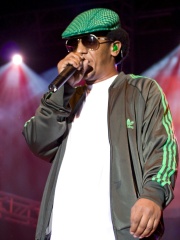
10. Tego Calderón (b. 1972)
With an HPI of 54.31, Tego Calderón is the 10th most famous Puerto Rican Singer. His biography has been translated into 35 different languages.
Tegui Calderón Rosario (born February 1, 1972) is a Puerto Rican rapper and actor. He began his musical career in 1996 (as Tego Tec) and was supported by the famous Puerto Rican rapper Eddie Dee, who invited him on his second studio album, El Terrorista de la Lírica, released in 2000. Calderón reached international success in 2003 with his first album, El Abayarde, which sold 300,000 copies worldwide and was nominated for a Latin Grammy Award. His importance in reggaeton music led him to participate in Eddie Dee's 12 Discípulos album in 2004. He released three more studio albums between 2006 and 2015, varying in styles, focusing more in hip hop and African music rather than reggaeton in The Underdog/El Subestimado (2006) and El Abayarde Contraataca (2007). His fourth studio album, El Que Sabe, Sabe, released in 2015, won a Latin Grammy Award for Best Urban Music Album. Calderón's style is characterized by his social and political themes, with lyrics against corruption in the Puerto Rican government. His themes also include dancing, love, self-reflection and personal experiences. His film career started in 2007 with his supporting role in Illegal Tender. In 2009 he had a lead role in a short film called Los Bandoleros, which is part of Fast & Furious franchise, and the same year had a cameo appearance in the fourth installment of that franchise, Fast & Furious. In 2011, he reprised his character in a supporting role in Fast Five, alongside his colleague and friend Don Omar.
People
Pantheon has 19 people classified as Puerto Rican singers born between 1935 and 1999. Of these 19, 17 (89.47%) of them are still alive today. The most famous living Puerto Rican singers include Ricky Martin, Daddy Yankee, and Luis Fonsi. The most famous deceased Puerto Rican singers include Héctor Lavoe, and Cheo Feliciano. As of April 2024, 2 new Puerto Rican singers have been added to Pantheon including La India, and Yandel.
Living Puerto Rican Singers
Go to all RankingsRicky Martin
1971 - Present
HPI: 66.81
Daddy Yankee
1977 - Present
HPI: 59.87
Luis Fonsi
1978 - Present
HPI: 58.09
Luis Miguel
1970 - Present
HPI: 57.70
Chayanne
1968 - Present
HPI: 56.76
Don Omar
1978 - Present
HPI: 55.66
Bad Bunny
1994 - Present
HPI: 55.45
Tego Calderón
1972 - Present
HPI: 54.31
Olga Tañón
1967 - Present
HPI: 49.48
Ivy Queen
1972 - Present
HPI: 48.37
Ozuna
1992 - Present
HPI: 47.01
Anuel AA
1992 - Present
HPI: 46.88

